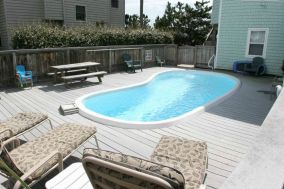An Outer Banks vacation home served as the setting for a nearly fatal drowning on the evening of July 29, 2015. A 3-year-old boy fell into the rental house’s in-deck backyard pool and went undiscovered for an unknown amount of time. As the accompanying picture, taken from the Corolla, North Carolina (NC), property’s website shows, the pool has a fence set many feet back from the water’s edge but no other barriers to entry.

News reports indicate that family members performed CPR on the toddler until emergency medical personnel arrived and that the young child was later flown by helicopter to a Norfolk hospital. It remains unknown whether the boy went without air for long enough to sustain permanent brain damage or other lifelong health problems.
Private pools pose the greatest risks for drowning, especially for children too young to know how to swim. Parents must accompany their kids at poolside or in the water at all times to prevent tragedies. No one can remain completely vigilant at all times, however. This makes restricting access to pools as much as possible essential. At a minimum, the Consumer Product Safety Commission recommends, a four-foot-high fence with a locking gate should run around the entire perimeter of any backyard pool.
Builders and homeowners often forgo including that safety feature because such a fence would ruin the look of a deck, patio or yard. Aesthetics should never take precedence over lives.
My Carolina personal injury law firm colleagues and I wish the boy a full and rapid recovery from his near drowning. We also want to take this opportunity to remind property owners and rental home managers that they must do everything they can to ensure the health of their visitors and customers. The legal principal underlying this admonishment is premises liability, which, in layman’s terms means that homeowners and businesses must remove or mitigate as many dangers as can be easily identified. In terms of a vacation house with a pool, doing that entails erecting a fence close enough to the pool that accidental entry becomes unlikely.
EJL







